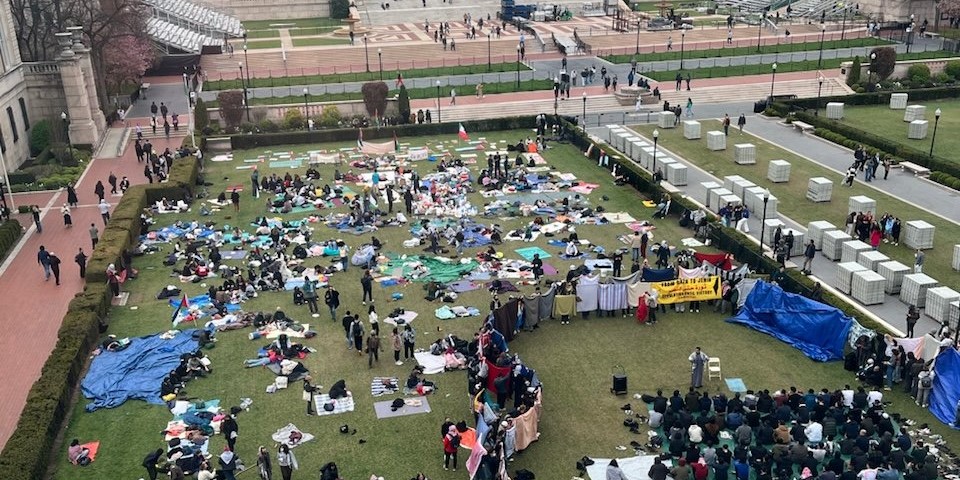 'Azadi' Calls For Palestine From Columbia University? (X image@sumit)
'Azadi' Calls For Palestine From Columbia University? (X image@sumit)For a moment, netizens thought it was Jawaharlal Nehru University (JNU) again, this time shouting out for the cause of Palestine when they heard “Azadi” and Palestine together. But it was Columbia University. The Indian students in the University joined the pro-Palestine protest in the campus singing ‘Azadi’ for Palestine. Azadi is an Urdu word, which means ‘Freedom’. And notably, Urdu is the language spoken by the majority of the Muslim population in India and Pakistan.
Now, the Azadi calls from Columbia appears to offend the Israeli supporters from India also. Comments below the video footage of Indian students singing in a playful manner “Freedom for Palestine” are varying. Some said “the virus from JNU” has reached Columbia. Azadi calls seemed to tick off the anti-Muslim sentiments among some, as they labelled protest as an agenda for “Muslim sovereignty”.
Shai Davidai, who is widely known as the pro-Israeli propagandist called the Columbia University protest an “illegal encampment” and said the student who was leading the slogans seemed angry but could not comprehend what she is saying since he do not know the language. He sounded offended.
British activist and comedian Chelsea Hart replied that there is nothing threatening in what she was saying. To that, another Israeli supporter said “the accusations implicit in the chants are anti-Israel, and the violent way she chants them is threatening indeed”, though there were no “accusation” but calls for freedom for Palestine.
Hart replied back to the comment that the student was literally asking people to dance and speak with love for Azadi. The British comedian went on to translate what the students were singing. Some of the lines were, “What do we want? (Freedom) / We will grab it (Freedom) / With dance we say (Freedom) / With love we say (Freedom) / Say it quite (Freedom) / Let Netanyahu hear (Freedom)/ Let Biden hear (Freedom) / Let Modi hear (Freedom)”.
This protest at Columbia in Hindi has been posted across platforms as a “sinister” display. Here is the actual translation of what she’s saying:
“What do we want?” (Freedom)
“What do we want?” (Freedom)
“Palestine’s” (Freedom)
“Palestine’s” (Freedom)
“We will grab it” (Freedom)… pic.twitter.com/jaLZZSSyUk— Chelsea Hart چلسی هارت (@chelseahartisme) April 20, 2024
A user named Ofra Haza Stan Account, said its the context in which Azadi is being used, which according to the user is used in protest for Kashmir. The user even went on to add that the protest is not about agenda but about freedom, and wrote, “When you look at the agenda, it’s not about freedom, it’s about Muslim sovereignty, That’s the problem with these protests. They pretend to be about human rights. But they’re not, they’re for Islamic rule”.
Interestingly, one user took the Azadi calls from Columbia to Kashmir, saying the Indian students have “Kashmiri blood on their hands!”. The user said, Indians are complicit in the “genocide, criminalization, and incarceration of Kashmiris for uttering the same ‘Azadi’ chants under the settler-colonial Indian occupation of Kashmir”.
Here she literally tells people to “dance” and “speak with love” which is arguably one of the most beautiful things the I’ve heard since October 7th. There is very a rich history of Urdu language political poetry dating back to the 50s. This particular style of chant comes from… https://t.co/yIskpHuxQD pic.twitter.com/VQn9El5PSA
— Chelsea Hart چلسی هارت (@chelseahartisme) April 21, 2024
Another user said, “This is a classic Marxist philosophy from JNU in Delhi which lead to chaos in India few years ago. Don’t encourage them. “. One other said, “This is a genocidal chant…which led to ethnic cleansing of Hindus in Kashmir..”. Some were keen on ‘clarifying’ that “the language is urdu not hindi. in hindi the word for freedom is swatantra, not azadi”.
The What And Where Of Azadi
The word Azadi means ‘Freedom’. It has become the heartbeat of Indian University students, especially the Jawaharlal Nehru University students. The word became popular among the students after student leader at JNU, Kanhaiya Kumar was arrested for his alleged participation in protest against the hanging of Mohammed Afsal Guru, an alleged convict in 2001 suicide attack in Indian Parliament. Kumar was released after it was clarified that he was not present at the protest at all.
However, after he was released, hundreds of students gathered in the campus of JNU and started singing the Azadi, which was telecasted by Indian media. From there on, ‘Azadi’ became the anthem of protest.
When the word first entered the popular consciousness, it was branded as “anti-national” by many, for it is an Urdu word and Urdu is the language of Pakistan. But the word have an interesting origin. It was used by feminist activist Kamla Bhasin against patriarchy during a women’s movement all over the South Asia back in 1991. The catchy beat of Azadi originated at Women’s Studies Conference in Kolkata’s Jadavpur University.
The original lines from Bhasin were, “Meri behane maange Azaadi, meri bachhi maange Azaadi, naari ka naara Azaadi… (My sisters seeks freedom, my daughter seeks freedom, every woman’s slogan is freedom)”. Bhasan said she learnt the slogan from Pakistani feminists and later improvised the words”.
Azadi became the word of rebellion and protest for its simplicity. One just needs to add it as a suffix, like Columbia University students said, “Hum kya chahte ? Azadi / Palestine kho bhi, Azadi (What do want? Freedom / For Palestine also, Freedom)”.
